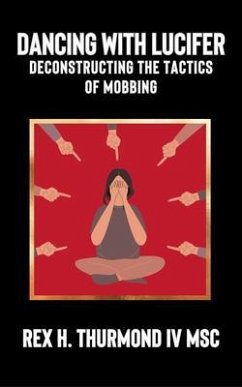Mobbing, a term originally coined to describe aggressive behaviors in bird species, has evolved into an important psychological and sociological phenomenon relevant to understanding the complexities of human interactions and the darker aspects of social behavior. This book, "Dancing With Lucifer: Deconstructing the Tactics of Mobbing," is a thorough examination of the multifaceted nature of mobbing in human societies. This investigation is more than just an academic exercise; it is a critical investigation into a widespread problem that affects individuals and groups in a variety of settings, from workplaces and schools to online communities and even within families. The phrase 'Dancing with Lucifer' metaphorically encapsulates the intricate and often menacing dance between perpetrators and victims, emphasizing mobbing's insidious nature and its ability to entangle individuals in a destructive and often inescapable rhythm of abuse and manipulation.
Mobbing, in essence, is a malignant form of group bullying in which one person is targeted by a collective - be it coworkers, peers, family members, or even faceless entities in the digital realm. Mobbing is distinguished by its group dynamics, as opposed to simple bullying, which typically involves one or a few individuals exerting power over another. It's a psychological crusade that frequently results in the targeted individual's ostracism, ridicule, and psychological torment. Understanding mobbing necessitates a thorough examination of various psychological theories and concepts, particularly those concerning group behavior and personality disorders. This book delves deeply into the role of Cluster B personality disorders, which include antisocial, borderline, histrionic, and narcissistic personality disorders, in creating mobbing environments. These disorders are distinguished by dramatic, overly emotional, or unpredictable thinking or behavior, as well as problematic interpersonal relationships. Individuals with these characteristics may be more likely to initiate or participate in mobbing activities, motivated by a desire for control, attention, or admiration, as well as a lack of empathy for their victims.
Furthermore, understanding the underpinnings of mobbing behavior requires an understanding of the Dark Triad and Dark Tetrad of personality, which include narcissism, Machiavellianism, psychopathy, and sadism. These personality constructs represent a constellation of traits associated with manipulation, callousness, and a disregard for the well-being of others, all of which are frequently found in those who lead or initiate mobbing scenarios. While these personality traits are uncommon in the general population, their impact, particularly in groups, can be profound and devastating. Victims of mobbing frequently share characteristics; they may be perceived as a threat because of their competence, popularity, or differences in values or behavior, making them the scapegoat for the group's frustrations and insecurities. The book delves into specific contexts where mobbing occurs, such as the workplace, educational institutions, and within families. Each environment presents its own set of challenges and dynamics.
The psychological interventions mentioned are critical in dealing with the trauma and aftermath of mobbing. Therapy and counseling are critical in assisting victims to recover, while support groups provide a forum for sharing experiences and healing. Public awareness campaigns are also important in changing societal attitudes toward mobbing and cultivating an environment of empathy and respect.
Mobbing, in essence, is a malignant form of group bullying in which one person is targeted by a collective - be it coworkers, peers, family members, or even faceless entities in the digital realm. Mobbing is distinguished by its group dynamics, as opposed to simple bullying, which typically involves one or a few individuals exerting power over another. It's a psychological crusade that frequently results in the targeted individual's ostracism, ridicule, and psychological torment. Understanding mobbing necessitates a thorough examination of various psychological theories and concepts, particularly those concerning group behavior and personality disorders. This book delves deeply into the role of Cluster B personality disorders, which include antisocial, borderline, histrionic, and narcissistic personality disorders, in creating mobbing environments. These disorders are distinguished by dramatic, overly emotional, or unpredictable thinking or behavior, as well as problematic interpersonal relationships. Individuals with these characteristics may be more likely to initiate or participate in mobbing activities, motivated by a desire for control, attention, or admiration, as well as a lack of empathy for their victims.
Furthermore, understanding the underpinnings of mobbing behavior requires an understanding of the Dark Triad and Dark Tetrad of personality, which include narcissism, Machiavellianism, psychopathy, and sadism. These personality constructs represent a constellation of traits associated with manipulation, callousness, and a disregard for the well-being of others, all of which are frequently found in those who lead or initiate mobbing scenarios. While these personality traits are uncommon in the general population, their impact, particularly in groups, can be profound and devastating. Victims of mobbing frequently share characteristics; they may be perceived as a threat because of their competence, popularity, or differences in values or behavior, making them the scapegoat for the group's frustrations and insecurities. The book delves into specific contexts where mobbing occurs, such as the workplace, educational institutions, and within families. Each environment presents its own set of challenges and dynamics.
The psychological interventions mentioned are critical in dealing with the trauma and aftermath of mobbing. Therapy and counseling are critical in assisting victims to recover, while support groups provide a forum for sharing experiences and healing. Public awareness campaigns are also important in changing societal attitudes toward mobbing and cultivating an environment of empathy and respect.
Dieser Download kann aus rechtlichen Gründen nur mit Rechnungsadresse in A, D ausgeliefert werden.









